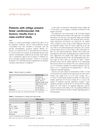20 citations,
March 2019 in “Case Reports in Dermatology” IL-17 inhibitors for psoriasis may cause unexpected hair loss.
 6 citations,
March 2016 in “Scandinavian journal of immunology”
6 citations,
March 2016 in “Scandinavian journal of immunology” Janus kinase inhibitors show promise in treating alopecia areata but need more safety research.
 May 2023 in “Frontiers in Immunology”
May 2023 in “Frontiers in Immunology” Treg cell-based therapies might help treat hair loss from alopecia areata, but more research is needed to confirm safety and effectiveness.
 1 citations,
January 2014 in “The Journal of Dermatology”
1 citations,
January 2014 in “The Journal of Dermatology” A patient with Ivemark syndrome developed mixed type vitiligo after a hepatitis C infection, showing different treatment responses and immune cell involvement in the skin.
 62 citations,
June 2015 in “The Journal of Dermatology”
62 citations,
June 2015 in “The Journal of Dermatology” People with alopecia areata have more Th17 cells and fewer Treg cells, which may be key to the condition's development.

Proretinal nanoparticles are a safe and effective way to deliver retinal to the skin.
 144 citations,
November 2020 in “Frontiers in immunology”
144 citations,
November 2020 in “Frontiers in immunology” Targeting the IL-23/IL-17 pathway effectively treats several inflammatory skin diseases.
 January 2024 in “Inflammation and regeneration”
January 2024 in “Inflammation and regeneration” Th22 cells are essential for Tβ15-induced hair growth in mice.
 48 citations,
January 2000 in “Hormone Research in Paediatrics”
48 citations,
January 2000 in “Hormone Research in Paediatrics” Cytokines and neuropeptides are key in controlling androgen levels, affecting skin and hair conditions.
45 citations,
June 2018 in “Frontiers in immunology” MDSC-Exo can treat autoimmune alopecia areata and promote hair regrowth in mice.
9 citations,
June 2023 in “Cells” Certain natural and synthetic compounds may help treat inflammatory skin diseases by targeting a specific signaling pathway.

Botulinum toxin type A significantly reduces scalp psoriasis severity compared to placebo.
 34 citations,
December 2015 in “Neuroscience & Biobehavioral Reviews”
34 citations,
December 2015 in “Neuroscience & Biobehavioral Reviews” Some hormone-related drugs may protect brain cells in Parkinson's disease differently in men and women.
 February 2024 in “Scientific reports”
February 2024 in “Scientific reports” Four genes are potential markers for hair loss condition alopecia areata, linked to a specific type of cell death.
 1 citations,
January 2020 in “Benha Journal of Applied Sciences”
1 citations,
January 2020 in “Benha Journal of Applied Sciences” Certain gene variations may increase the risk and severity of alopecia areata.
1 citations,
May 2024 in “International Journal of Molecular Sciences” Adenosine receptors could be promising targets for treating inflammatory skin diseases like psoriasis.
53 citations,
July 2018 in “Drug design, development and therapy” Janus kinase inhibitors show promise in treating alopecia areata but need better topical formulations.
23 citations,
December 2013 in “Journal of Investigative Dermatology Symposium Proceedings” Genetic discoveries are leading to new treatments for alopecia areata.
 June 2006 in “Almustansiriya journal of pharmaceutical sciences/Al-Mustansiriyah journal of pharmaceutical sciences”
June 2006 in “Almustansiriya journal of pharmaceutical sciences/Al-Mustansiriyah journal of pharmaceutical sciences” Melatonin may help reduce the needed dose of prednisolone and improve hair growth in alopecia areata patients.
 11 citations,
October 2001 in “Dermatologic Clinics”
11 citations,
October 2001 in “Dermatologic Clinics” The document concludes that DAB389-IL2 is promising for treating refractory cutaneous T-cell lymphoma, but more research is needed on its effectiveness and side effect management.
 134 citations,
January 2019 in “American journal of clinical dermatology”
134 citations,
January 2019 in “American journal of clinical dermatology” Antibiotics can reduce acne but may lead to resistant bacteria, and understanding the skin's bacteria is important for treatment.
 17 citations,
December 2011 in “Journal of the European Academy of Dermatology and Venereology”
17 citations,
December 2011 in “Journal of the European Academy of Dermatology and Venereology” People with vitiligo may have a lower risk of heart disease.
 April 2023 in “Medizinische Genetik”
April 2023 in “Medizinische Genetik” New research has found 14 genes linked to the risk of developing alopecia areata, improving understanding and treatment options.
 1 citations,
October 2023 in “Clinical, cosmetic and investigational dermatology”
1 citations,
October 2023 in “Clinical, cosmetic and investigational dermatology” Tofacitinib improved hair loss and skin symptoms in a patient after secukinumab caused hair loss.
 August 2024 in “Bioscience of Microbiota Food and Health”
August 2024 in “Bioscience of Microbiota Food and Health” Microbes might play a role in vitiligo.
 December 2023 in “Research Square (Research Square)”
December 2023 in “Research Square (Research Square)” These specific gene polymorphisms are not linked to Alopecia Areata in Egyptians.
18 citations,
May 2019 in “The journal of investigative dermatology/Journal of investigative dermatology” Different parts of the body have unique immune characteristics in their skin.
35 citations,
November 2021 in “Journal of nanobiotechnology” Thymol-loaded nanoparticles are a promising, natural treatment for acne that avoids antibiotics and preserves healthy skin bacteria.
 1 citations,
July 2015 in “Cytokine”
1 citations,
July 2015 in “Cytokine” Finasteride improves immune response and reduces organ damage after trauma hemorrhage in mice.
 8 citations,
July 2018 in “European Journal of Dermatology”
8 citations,
July 2018 in “European Journal of Dermatology” A medication may help with hair growth in psoriasis, and a skin condition might be linked to a specific bacteria.





















